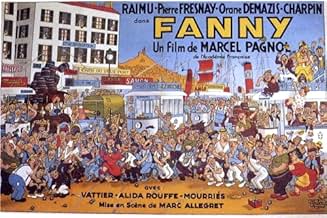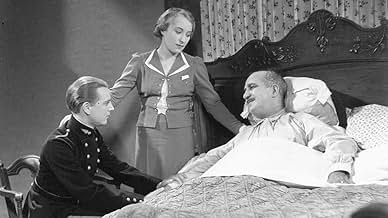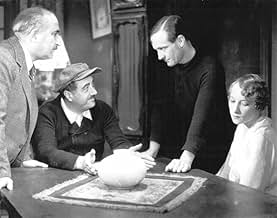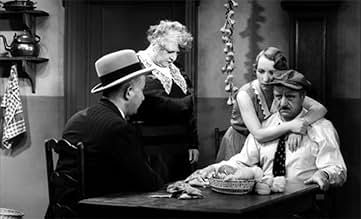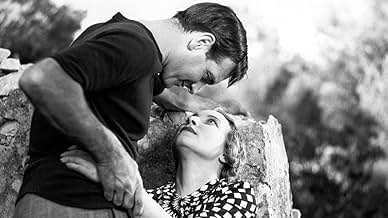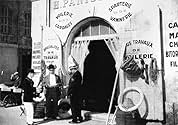After Fanny's boyfriend leaves her and sails away, she finds out she's pregnant.After Fanny's boyfriend leaves her and sails away, she finds out she's pregnant.After Fanny's boyfriend leaves her and sails away, she finds out she's pregnant.
Fernand Charpin
- Honore Panisse
- (as Charpin)
Auguste Mouriès
- Félix Escartefigue
- (as Mouriès)
Robert Vattier
- Albert Brun
- (as Vattier)
Édouard Delmont
- Dr. Felicien Venelle
- (uncredited)
Pierre Prévert
- Un voyageur du tramway
- (uncredited)
Annie Toinon
- Amélie
- (uncredited)
Featured reviews
Part the Second of this trilogy reminds us that at heart it is pure melodrama and if not quite 'dead! and never called me mother', it is certainly from the same stable. Arguably Orane Demazis - replicating here, as indeed are all the principals, her stage role as the eponymous seduced and abandoned and slightly enceinte ingenue - is the weakest link in an unusually strong chain yet even then with the handicap of being saddled with a role that today would be risible (I doubt if it is possible to 'SPOIL' a classic which is now some 72 years old so suffice it to say that as a result of 'giving herself' to Marius, shortly before he ships out on an extended cruise, Fanny finds herself in an 'interesting' position and must make some tough choices. Today, of course, it is practically an honor to fall pregnant with no father material in sight and a State standing by to cosset the resulting infant from cradle to grave but in 1932 the resulting 'shame' embraced not only the mother-to-be but also her family) she manages to elicit our compassion and keep our humor at bay. Pedants will have a field day with the dodgy arithmetic - Marius has supposedly signed up for a five-year voyage yet on his return Fanny's son is a mere 10 months old - but what matters is the acting-plus-believability factor and here, thanks as always to the great Raimu, aided and abetted by Fernand Charpin, Alida Rouffe and Milly Mathis they bring it off to a fare-thee-well. Pierre Fresnay as Marius does little more than play the fly-in-the-ointment in the closing quarter of the movie and may well have been looking ahead one full decade to 'Le Corbeau'. Building on the first part and moving seamlessly to the next stage this is a worthy successor to 'Marius'. 9/10
10rsoonsa
FANNY is the second film of a trilogy, based upon a play by Marcel Pagnol, from which all three works are taken, featuring most of the cast of excellent actors which made the stage original a great artistic and popular success, including Raimu, Charpin, Pierre Fresnay, and Orane Demazis as Fanny, an assemblage which remains faithful to the heart of the original. By repudiating the normal placement of concurrent French films made in Parisian studios, and producing the work in his native Marseilles, in Provence, Pagnol achieves a finely-hewn naturalism which is very congenial to the scenario, dealing as it does with a hard-working bourgeoisie whose lives are in concert with rhythms of a major seaport. Fanny's passionate attention to Marius (Fresnay) results in her pregnancy from their farewell coupling at the denouement of the first of the trilogy, MARIUS, with her lover falling prey to the lure of a seafaring life and she, abandoned, accepts a proposal of marriage from a much older M. Panisse (Charpin), in order to save the reputation of her family. The love of Panisse for the child of Fanny is the moving force in what must be the inevitable fulfillment of the storyline, i.e., the return of Marius to claim his erstwhile fiancée and his true child in a scene which brings the best from Demazis, Fresnay, and Raimu as Cesar, the father of Marius and lifelong friend of Panisse. Pagnol directed only the finale of the trio, and selects for FANNY Marc Allegret, who leads the cast with distinction, displaying particular skill when allowing Pagnol's magnificent dialogue to be developed in what is essentially a filmed work for the stage, with few sets, and who allows liberal emphasis upon the plastic Raimu, who is, after all, the most important presence in this romantic masterpiece.
I have just finished watching Proof, a film released in the year of our Lord, 2005, which is adapted from a stage play in which the director has gone to great pains to hide the fact that his work is based on the play. flash back 70 years and we have a movie made that looks like a filmed stage play with real locations replacing the stage sets. All early sound movies feel set-locked as people talk and deliver within the range of the camera. Therefore, to hold the interest to the modern viewer, the dialogue and acting must be believable and engaging. The film fails to achieve it for the most part because the performance of the actress playing Fanny is a total success even though she was reprising her role from the stage. First time director, Pagnol adapting his own stage works suffers from a non-visual eye. The delight, is French star Raimu who delivers a performance still worthy to the eye even today. There is a reason Orson Welles called him a genius. The melodramatic plot of a scorned, (maybe that is too strong a word: even abandoned is too strong because she never lets on to her man that she does not want him to leave) woman who is pregnant is passé though common in the literature of the period. I remember a tracking shot that impressed me as the camera follows Fanny through the streets as she suspects she is pregnant. In the way it is handled and executed, it is cinematic authorship at its finest. It is a film in the middle of the trilogy, therefore there are loose ends left to be resolved. All movies are time capsules, it is said, therefore approach this with the right attitude and you might be rewarded.
Criterion / Janus Films
Marius (1931) + Fanny (1932) + César (1936)
Directed by Marc Allégret, "Fanny" holds a significant place in the golden age of French cinema as the second film in Marcel Pagnol's renowned Marseille Trilogy. I'm only discovering this now because these films have never been shown in my country (Turkey) on any platform, past or present.
Within the context of the trilogy, "Fanny" continues the story that began with "Marius" (1931) and forms a crucial part of the epic love and family saga that will conclude with "César" (1936), which is my next stop and yet to be watched, based on my research.
From the perspective of cinema in its time, "Fanny" is considered a remarkable example of the power of dialogue and performance, even though the era of sound film was still in its early stages. Pagnol's theatrical writing style has been successfully adapted to the screen, masterfully reflecting the depth of the characters and the emotional intensity of the story.
The film, dealing with universal themes such as love, sacrifice, family ties, and societal expectations, manages to appeal to modern audiences as well. From the perspective of today's cinema, "Fanny" stands out with its themes that still resonate with contemporary viewers. Its importance within the Marseille Trilogy is undeniable. According to my research, many authorities consider "Fanny" to be the heart of the trilogy.
The impressive performances of Orane Demazis and Pierre Fresnay create unforgettable moments in the film. In particular, Orane Demazis's portrayal of Fanny perfectly reflects the character's inner conflicts and emotional journey. "Fanny" stands out not only as a period film but also for its exploration of the complexities of human nature and the impact of societal norms on individuals' lives. The film addresses moral dilemmas and characters' difficult decisions with understanding, without judgment, and manages to do so without ever boring the audience.
Next stop: César (1936)
Marius (1931) + Fanny (1932) + César (1936)
Directed by Marc Allégret, "Fanny" holds a significant place in the golden age of French cinema as the second film in Marcel Pagnol's renowned Marseille Trilogy. I'm only discovering this now because these films have never been shown in my country (Turkey) on any platform, past or present.
Within the context of the trilogy, "Fanny" continues the story that began with "Marius" (1931) and forms a crucial part of the epic love and family saga that will conclude with "César" (1936), which is my next stop and yet to be watched, based on my research.
From the perspective of cinema in its time, "Fanny" is considered a remarkable example of the power of dialogue and performance, even though the era of sound film was still in its early stages. Pagnol's theatrical writing style has been successfully adapted to the screen, masterfully reflecting the depth of the characters and the emotional intensity of the story.
The film, dealing with universal themes such as love, sacrifice, family ties, and societal expectations, manages to appeal to modern audiences as well. From the perspective of today's cinema, "Fanny" stands out with its themes that still resonate with contemporary viewers. Its importance within the Marseille Trilogy is undeniable. According to my research, many authorities consider "Fanny" to be the heart of the trilogy.
The impressive performances of Orane Demazis and Pierre Fresnay create unforgettable moments in the film. In particular, Orane Demazis's portrayal of Fanny perfectly reflects the character's inner conflicts and emotional journey. "Fanny" stands out not only as a period film but also for its exploration of the complexities of human nature and the impact of societal norms on individuals' lives. The film addresses moral dilemmas and characters' difficult decisions with understanding, without judgment, and manages to do so without ever boring the audience.
Next stop: César (1936)
If you can get by the first fifteen minutes, get into the leisurely pacing and that fact that nothing is going to explode and no one shoots anybody or stabs anyone in the eye, and the film is about learning to live with other human beings, about being a parent, about falling and staying in love, perhaps you'll come to love this film, too.
The trilogy is set in another time long gone--Marseilles, a provincial fishing village, where Cesar and his son operate a sort of bar where locals drift in and out and play cards; a pretty young woman sells seafood outside, and she's known son Marius since they were children. Enough said: except that the acting is amazingly naturalistic for a 1930's film, that the performance by famed French entertainer Raimu is beyond words, is simply astounding in his range of emotions, his understanding of the human condition. This understated drama is a quiet masterpiece.
The trilogy is set in another time long gone--Marseilles, a provincial fishing village, where Cesar and his son operate a sort of bar where locals drift in and out and play cards; a pretty young woman sells seafood outside, and she's known son Marius since they were children. Enough said: except that the acting is amazingly naturalistic for a 1930's film, that the performance by famed French entertainer Raimu is beyond words, is simply astounding in his range of emotions, his understanding of the human condition. This understated drama is a quiet masterpiece.
Did you know
- TriviaFamed restaurateur and founder of California cuisine, Alice Waters, was so taken with the Fanny trilogy that she named her Berkeley restaurant Chez Panisse. The café upstairs from the restaurant is decorated with posters from the films Marius, Fanny, and César. Waters also named her own daughter Fanny and opened a small breakfast café in Berkeley called "Café Fanny" in 1984 which closed in March 2012.
- ConnectionsEdited into Histoire(s) du cinéma: Une histoire seule (1989)
- How long is Fanny?Powered by Alexa
Details
Box office
- Gross US & Canada
- $8,262
- Opening weekend US & Canada
- $7,720
- Jan 8, 2017
- Gross worldwide
- $8,262
- Runtime2 hours 20 minutes
- Color
- Aspect ratio
- 1.20 : 1
Contribute to this page
Suggest an edit or add missing content



